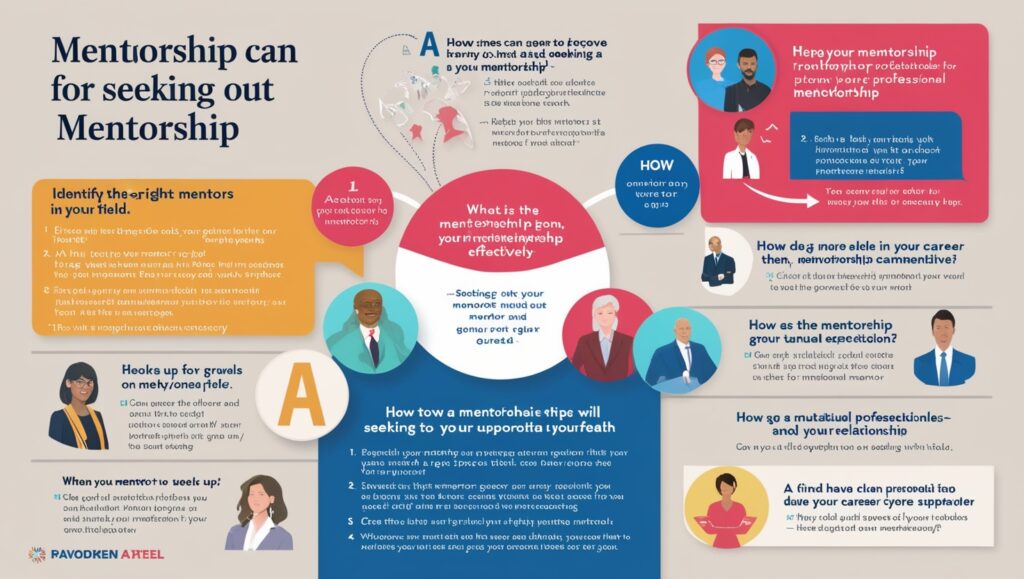How to Seek Out Mentorship for Career Advancement
Mentorship can be a transformative experience that significantly impacts your professional growth and career trajectory. Having a mentor provides you with guidance, insight, and support, helping you navigate challenges, develop skills, and seize opportunities in your field. However, seeking out mentorship can feel daunting, especially if you’re unsure where to start. In this blog, we’ll explore the importance of mentorship, how to identify potential mentors, and effective strategies for approaching and cultivating these relationships.
1. Understanding the Importance of Mentorship
What is Mentorship?
Mentorship is a relationship where a more experienced or knowledgeable individual (the mentor) provides guidance, support, and advice to someone less experienced (the mentee). This relationship can take many forms, including formal programs, informal connections, or industry-specific interactions.
Why Mentorship Matters
- Knowledge and Experience: Mentors have often navigated similar career paths and can provide invaluable insights and advice based on their experiences.
- Skill Development: Mentorship can help you develop specific skills and competencies that are crucial for career advancement.
- Networking Opportunities: Mentors often have extensive networks and can introduce you to key contacts within your industry.
- Support and Encouragement: A mentor can provide emotional support during challenging times, helping you stay motivated and focused on your goals.
2. Identifying Potential Mentors
Know What You Need
Before you begin your search for a mentor, take time to assess your career goals and the areas in which you seek guidance. Consider:
- Your Industry: Look for professionals who have experience in your field or a related industry.
- Specific Skills: Identify the skills you want to develop or enhance, such as leadership, project management, or technical abilities.
- Career Path: Seek mentors who have successfully navigated the career path you aspire to follow.
Where to Find Potential Mentors
- Within Your Organization: Look for senior colleagues or managers who have a track record of mentoring others.
- Professional Associations: Many industry associations offer formal mentorship programs or networking events where you can meet potential mentors.
- Networking Events: Attend conferences, workshops, and meet-ups to connect with experienced professionals.
- Online Platforms: Utilize platforms like LinkedIn to identify and reach out to potential mentors who share your interests and career goals.
3. Approaching a Potential Mentor
Crafting Your Message
Once you’ve identified potential mentors, it’s time to reach out. Here are some tips for crafting a compelling message:
- Be Clear and Concise: Clearly state who you are, what you’re looking for, and why you believe they would be a good mentor for you.
- Personalize Your Approach: Reference something specific about their background or work that resonates with you. This shows that you’ve done your research and are genuinely interested in them.
- Express Your Intentions: Be upfront about your desire for mentorship, whether it’s for career advice, skill development, or networking opportunities.
4. Building a Strong Mentorship Relationship
Set Clear Expectations
Once you’ve established a mentorship relationship, it’s essential to set clear expectations for both parties:
- Define Your Goals: Discuss your career objectives and what you hope to achieve through mentorship.
- Frequency of Meetings: Agree on how often you will meet or communicate, whether it’s weekly, bi-weekly, or monthly.
- Communication Preferences: Determine how you’ll communicate (in-person, phone, video calls, or email) and what works best for both of you.
Be Open and Receptive
A successful mentorship relationship requires open communication and a willingness to receive feedback:
- Ask Questions: Don’t hesitate to ask for clarification or more information on topics of interest. This shows your eagerness to learn and engage.
- Be Receptive to Feedback: Accept constructive criticism gracefully and use it as a tool for growth.
- Share Your Progress: Keep your mentor informed about your achievements and challenges, as this helps them provide relevant guidance.
5. Giving Back to Your Mentor
Mutual Benefit
Mentorship should be a two-way street. While you’re seeking guidance, it’s essential to consider how you can add value to your mentor:
- Show Appreciation: Express gratitude for their time and insights, whether through a thank-you note or a small gesture.
- Share Resources: If you come across articles, events, or tools that may benefit your mentor, share them as a token of appreciation.
- Offer Your Skills: If your mentor has a project or initiative that aligns with your skills, offer to help out in any way you can.
6. Expanding Your Mentorship Network
Seek Multiple Mentors
Consider seeking out multiple mentors who can offer different perspectives and insights
- Diverse Expertise: Having mentors with varied experiences can provide you with a well-rounded view of your industry and career options.
- Peer Mentorship: Don’t overlook the value of learning from peers. Engaging in mutual mentorship with colleagues can be equally beneficial.
- Stay Open to New Connections: As you progress in your career, continue to seek out new mentors who can help you navigate different stages and challenges.
Final Thoughts
Seeking mentorship is a proactive step toward career advancement and personal growth. By understanding the importance of mentorship, identifying potential mentors, and effectively approaching them, you can cultivate relationships that significantly impact your professional journey. Remember to set clear expectations, be open to feedback, and give back to your mentor, creating a mutually beneficial dynamic. Embrace the mentorship experience, stay committed to your growth, and watch as your career flourishes with the support of those who have walked the path before you. Whether you’re just starting out or looking to take your career to the next level, mentorship can be the catalyst you need to achieve your goals.

